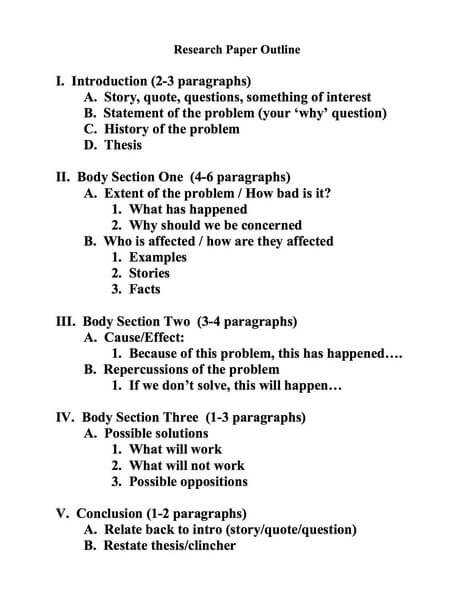
Research Paper Outline: Definition
A research paper outline is a simple structure of what you will include in each part of your research paper. The research paper structure should help to reduce the stress of writing the entire paper since you will only be tackling one section at a time. A good research paper structure should also help you avoid leaving out points or making mistakes in the paper.
Research paper outlines can make your work a lot easier since they show you what to include in every part of the research paper. After reading this guide, you will be able to create a research paper outline. We have included a sample of a research paper structure.
FAQs
A research paper outline should include all of the essential parts of a research paper. The essential parts are generally the introduction, the main section, and the conclusion. The introduction should contain a hook, a thesis statement, and it should define the research topic. The body should contain your arguments in support of the thesis. In the conclusion, you should summarize your arguments and add a call to action.
For the research paper outline, there are many strategies that you can use. Which one you choose, depends on your research paper topic, and your lecturers’ instructions. The research paper outline is most commonly formatted with letters and (or) numbers. Usually, the format of a research paper outline starts with Roman numerals for the main topics (I., II., III., …). For subtopics, uppercase letters are often used (A., B., C., …). For detailed parts of your subtopics, use Arabic numbers (1., 2., 3., …). And if there are any subparts, you can use lowercase letters for them (a., b., c., …).
Your research paper outline should simply show what you will include in each section of your research paper. For example, the introduction, body paragraphs and conclusion. You should show the main ideas that will be covered in each of the specific sections. The research paper outline should follow the layout of the actual study, and each part should contain points that are relevant to the corresponding section.
MLA stands for the Modern Language Association and APA stands for the American Psychological Association. They are both methods for formatting research papers. The main differences are in the referencing styles and the cover pages. Which method you are required to use, will depend on your area of research. Areas in humanities usually require you to use MLA, whereas scientific research usually requires APA formatting.
Before writing your research paper outline, you need to have completed the research phase. This means that you should have decided on your research topic and your research question. You need to have already written at least a draught thesis statement. You can’t create a research paper outline, if you don’t know which areas within your research topic are going to be covered.
Structure
A research paper outline should have the following parts:
Your research paper outline should be well divided. First, you will determine what you will include in the abstract. This part basically works as a brief summary of your entire paper, and in the research paper outline, you should include the key points to include in this section.
The next part of your research paper outline will be the introduction. This part hooks the reader to the paper and should contain some key details. As you create your research paper outline, make sure you include the thesis statement, the core terms in the paper, and major points tackled in the paper.
The body part of your research paper outline should have the most information. This part of the research paper outline should contain different sections. Immediately after the introduction, you should show what you will include in your methodology. You should make notes on the methods used to carry out the research. You should then note the literature you used as a backup to your hypothesis and theories. In the research paper outline, you should mention the main theme of your study, along with how you intend to expand on the chosen literature.
After this part, your research paper outline should show the data and analysis section of the study. Note your results and other variables that you got in the study and indicate your preferred method of presenting the data. This could be with tables, graphs, etc.
A summary of the research findings and conclusions should also be included in this part of the research paper structure. Determine whether the findings make a difference to existing studies. Also, note the drawbacks of the research and its advantages.
Example
To make your work easier, you can use this format and add the details of your own research paper structure. Note that this format may need to be changed depending on the type of research and the writing style requested. The following is an example of a research paper outline:

APA Outline
When writing the research paper with the APA format, you should consider the particularities of this style. First, remember that the papers include separate cover pages, and the cover page includes the title, author’s name, school name, and running head. The header on every next page has a number and title. With this format, the abstract has to be followed by keywords. The list of cited sources is titled as ‘References’. You should note these items in the research paper outline to make sure you don’t get anything wrong.
MLA Outline
As you complete your research paper outline for an MLA paper, you should remember that the citation styles differ based on the type of source. For example, a book will be cited differently from a video or magazine article. With MLA format, you will also not need to worry about title pages, unless your instructors indicate that they need a title page. In the research paper outline, the titles and emphasis points should all be written in italics. Before writing your cited works, you should consider making a list of the endnotes. The subheadings should be marked with Arabic numbers.
In a Nutshell
- Research paper outlines can make your work easier and will ensure that you don’t miss anything out of your paper.
- Research paper outlines differ based on the formating style used. APA research paper outlines will be slightly different from the MLA research paper outlines.
- A research paper outline should have an introduction, body, and conclusion.
- You should make brief notes on your main points and arguments in the research paper structure and refer to them when writing the paper itself.
